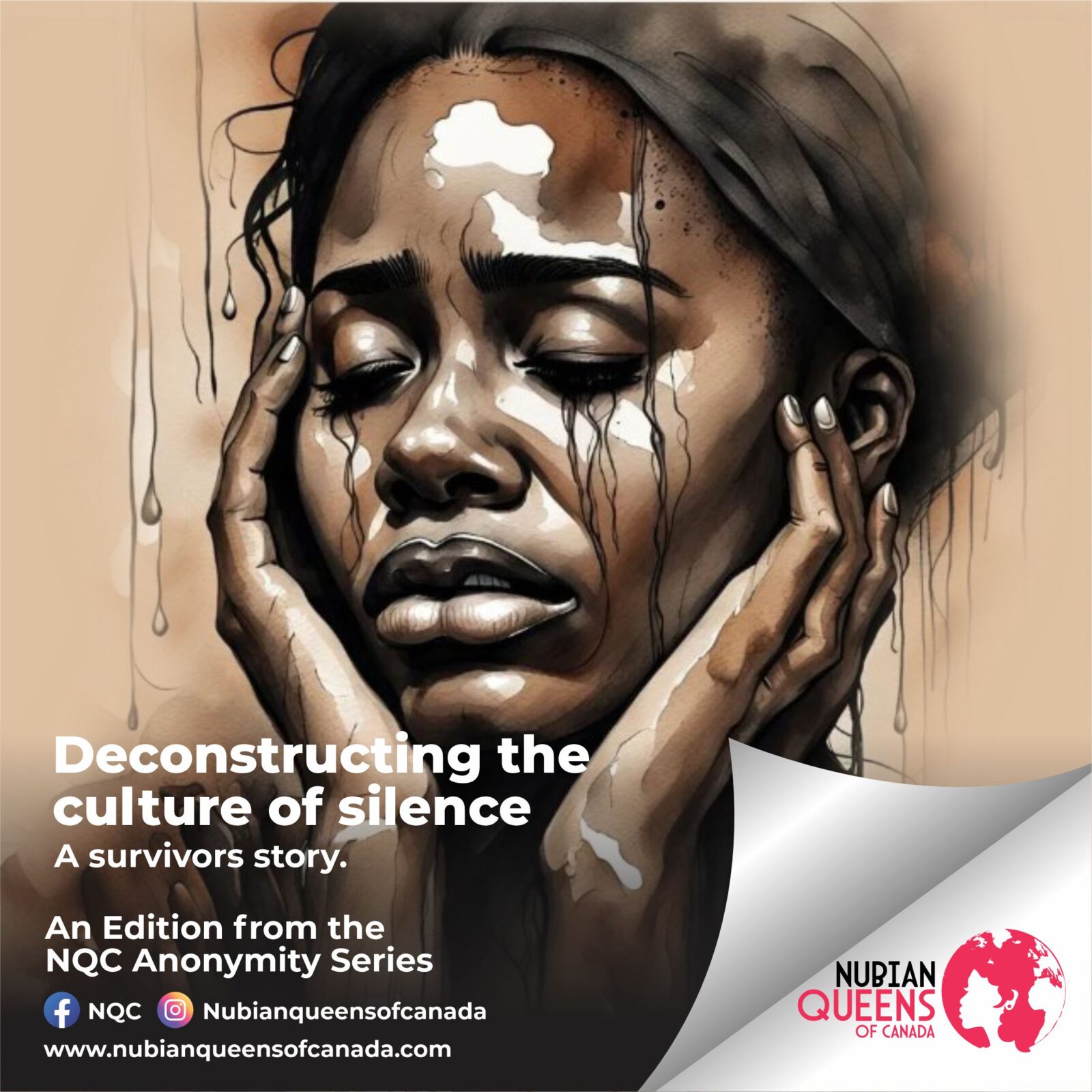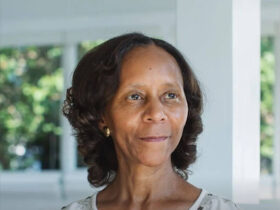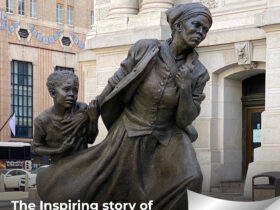Nike (real name withheld) migrated to Canada in 2022. A victim of a toxic, verbally and emotionally abusive marriage, she hoped this migration would give her family a new and fresh start, but she was wrong. The abuse escalated, and her mental health, which had taken a battering for over ten years of her marriage, began to decline sharply. Her self-esteem took a downturn, and she began to doubt herself and her abilities. She reached the point of no return after she opted for a separation and, in spite of this, experienced sexual abuse at the hands of her partner. Read her full story here:
Nike stood at the shop entrance, and that was when she saw the older woman walking behind her husband. The man had this swagger atypical of the male macho species, but the woman’s walk was docile and timid, almost as if she were walking in his shadows. The worst part was the dead look in the woman’s eyes; they were lifeless, emptied of her hopes and dreams. This woman had forgotten how to dream, and she had forgotten how to live. Nike turned and looked at her as she walked past, and she kept looking until the woman disappeared from view. She looked because she saw in that woman a version of herself if she hadn’t promptly taken the steps for a better future.
About eleven years ago, Nike got married, all dewy-eyed and oblivious to the future. She, her partner and three children lived okay. The first years of their marriage were tough financially, but eventually, things smoothed out. She worked most of the time and contributed everything she earned to her home. But no worries, it was her family, and she was glad to do it. She cared for the older children like they were hers, but her daughter, her only biological child, was the apple of her eyes. Her partner showed little initiative career-wise and often frustrated her attempt to scale the corporate ladder. He became overbearing and did not encourage her to aspire for more. Work became her escape as staying home with him became unbearable.
Thinking back, the verbal abuse had been subtle at first, but it escalated and became normal with time. The acts of physical violence were few and far between, but they became an element of threat used to coerce submission. He could talk and curse as much as he wanted but would view it as a sign of disrespect when Nike reciprocated. In time, the older children followed suit and began to show signs of passive aggression. All of these wore on her self-esteem and threatened her peace, and for her, home became the antithesis of what it should be. Her mental health took a downturn, her self-esteem declined, and it reflected in her work and social relationships. She adjusted and readjusted until abuse became the norm, and her marriage became a sham. At this point, she didn’t give a hoot if he had extramarital affairs; if that meant she got a reprieve, and she could breathe, he was free to do whatever; she just needed her peace.
After eleven years, the family relocated to Canada and it was here that things fell apart. A few months after they had settled into the apartment, Nike reprimanded one of the children and for this, her husband proceeded to insult her, calling her unprintable names. He threw her things from their shared bedroom, stopped her from using the family car, eating groceries she didn’t buy, and watching the TV he’d bought. She’d had enough and opted for a separation. So, she took her daughter and left; she rented an apartment and was gradually settling into life as a single mother.
This was hard for him to accept; it was a blow to his ego, and he used emotional blackmail to guilt-trip her into coming back, which didn’t work. While she worked through all the drama and manipulation, Nike agreed to have her daughter stay with her during the week and with her dad on weekends. So, one Sunday evening, Nike went to pick up her daughter. She had called earlier, and he told her their daughter was home; she walked into the apartment, where it soon became evident that he was the only one at home. He said he had sent the kids out to get fast food and then pushed her towards the room. Nike resisted him and was about to walk out of the house when he brought out a pen knife and threatened her with the weapon. Eventually, he pushed her to the room and forced himself on her. After he was done, she tied a towel, excused herself to use the restroom, and then went to the kitchen (which was close to the main entrance) to get a glass of water. She had calculated her escape move and though she was wrapped in a towel, her desperation to escape trumped her indecent clothing. She walked calmly to the door and looked back. She then saw him running towards her, and she opened the door and ran out in a towel, screaming for help. She walked down to the buzzer and called the building manager, explaining the situation as best as possible and asked the manager to call the police. He came downstairs afterwards, and she ran to the car park to get further away from him. There was a shouting match, and she told him to get her clothes, which she wore in her car. The police came, and he was arrested. She was asked to go to the hospital for a checkup, the house was sealed off as a crime scene, and investigations began. The Social Services department got involved, and Nike went for counselling and therapy sessions for survivors of sexual violence. She is still being followed up to ensure she gets her life back on track.
The reason Nike shares this story is to give hope to women in abusive relationships.
“YOU ARE NOT ALONE”, she says, “I have been there, and I am out now; my self-esteem is healing every day, and I am thankful with every bone in my body that I took the decision to speak up and speak out. I am also glad I took the decision to leave, or else I would have grown into an angry and frustrated woman, too bitter to be productive. I would have forgotten what it meant to dream, aspire, and become”.
Nike further reiterates that another aspect of her healing journey, which many people often take for granted, is actively forgiving the offender. So, while at a counselling session for survivors of sexual violence, Nike gave an illustration of what it means to forgive. According to her, holding someone down in your heart means you have to stay down yourself to hold someone down. So, while you are angry and holding someone down in your heart, the unintended effect is that you are also held down and can’t make progress while doing this.
The opposite of this happens when you forgive; when you free the person, you are free to heal, you are free to be at peace, you are free to make progress and move on. FORGIVENESS IS FOR YOU, not necessarily for the offender. YOUR HEALING CAN ONLY START WHEN YOU FORGIVE AND LET GO. This does not mean forgiveness comes easy, but you can forgive by asking God to help you and trusting that He will be your strength.
Now, Nike has filed for a divorce, and though her ex-husband embarked on a smear campaign to tell all kinds of malicious lies and slanderous accusations against her, she has resolved to maintain her peace and let God fight for her. She lives a quiet and peaceful life with her daughter, and is healing from over ten years of verbal and emotional abuse in a toxic marriage. She has come a long way, both business and career-wise, and the future looks promising.
Nike tells her story from New Brunswick, Canada.
Names and events have been changed and omitted to protect the identity and preserve the anonymity of the storyteller.
Statistics show that 44% of women aged 15 years and older have identified as victims of intimate partner violence, and every six days, a woman in Canada is murdered by her intimate partner (Government of Canada, 2022). Speaking up and taking affirmative action by reporting these crimes is an effective way to combat this looming threat of femicide in our society.













Leave a Reply